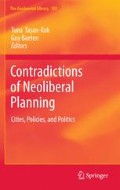Abstract
Neoliberalism may be a widely used term in both scientific and popular writings, but there remains much confusion over what its exact contents are – Brenner, Peck, and Theodore (2010a) have called it a ‘rascal’ concept but confirm elsewhere (Brenner, Peck, & Theodore, 2010b) that it remains a ‘keyword for the understanding of regulatory reforms of our time’. Smith (2008) has declared neoliberalism ‘dead but dominant’, and some call for a shift in focus from analysis and critique to the exploration of possible postneoliberalisms (see for example Brand and Sekler (2009) in the theme issue on postneoliberalism in Development Dialogue).
Access this chapter
Tax calculation will be finalised at checkout
Purchases are for personal use only
References
Amin, A. (2006). The good city. Urban Studies, 43(5/6), 1009–1023.
Bondi, L. (2005). Working the spaces of neoliberal subjectivity: Psychotherapeutic technologies, professionalisation and counselling. Antipode, 37(3), 497–514.
Brand, U., & Sekler, N. (2009). Postneoliberalism: Catch-all word or valuable analytical and political concept? – Aims of a beginning debate. Development Dialogue, 51, 5–14.
Brenner, N., Peck, J., & Theodore, N. (2010a). Variegated neoliberalisation: Geographies, modalities, pathways. Global Networks, 10(2), 182–222.
Brenner, N., Peck, J., & Theodore, N. (2010b). After neoliberalisation? Globalisations, 7(3), 327–345.
Davis, M. (1990). City of Quartz. Excavating the future of Los Angeles. London: Verso.
Fainstain, S. (2010). The just city. New York: Cornell University Press.
Florida, R. (2002). The rise of the creative class: And how it's transforming work, leisure, community and everyday life. New York: Basic Books.
Friedmann, J. (2000). The good city: In defense of utopian thinking. International Journal for Urban and Regional Research, 24(2), 460–472.
Gunder, M. (2006). Sustainability: Planning's saving grace or road to perdition? Journal of Planning Education and Research, 26(2), 208–221.
Harvey, D. (2005). A brief history of neoliberalism. Oxford: Oxford University Press.
Harvey, D. (2008). The right to the city. New Left Review, 53, 23–40.
Healey, P. (1997). Collaborative planning. Shaping places in fragmented societies. London: Palgrave MacMillan.
Klein, N. (2007). The shock doctrine. The rise of disaster capitalism. New York: Metropolitan Books.
Larner, W. (2000). Neoliberalism: Policy, ideology, governmentality. Studies in Political Economy, 63, 5–26.
Lefebvre, H. (2009 [1968]). Le droit à la ville. Vers la Sociologie de l’Urbaine, Paris: Ellipses.
Mitchell, D. (2003). The right to the city: Social justice and the fight for public space. New York: Guilford.
Peck, J., Theodore, N., & Brenner, N. (2009). Postneoliberalism and its malcontents. Antipode, 41(1), 94–116.
Rose, N. (1999). Powers of freedom: Reframing political thought. Cambridge: Cambridge University Press.
Smith, N. (2008). Neoliberalism: Dead but dominant. Focaal, 51, 155–157.
Soja, E. (2010). Seeking spatial justice. Minnesota, MN: University of Minnesota Press.
Wacquant, L. (2009). Punishing the poor. The neoliberal government of social security. Durham, NC: Duke University Press.
Author information
Authors and Affiliations
Corresponding author
Editor information
Editors and Affiliations
Rights and permissions
Copyright information
© 2012 Springer Science+Business Media B.V.
About this chapter
Cite this chapter
Baeten, G. (2012). Neoliberal Planning: Does It Really Exist?. In: Tasan-Kok, T., Baeten, G. (eds) Contradictions of Neoliberal Planning. GeoJournal Library, vol 102. Springer, Dordrecht. https://doi.org/10.1007/978-90-481-8924-3_11
Download citation
DOI: https://doi.org/10.1007/978-90-481-8924-3_11
Published:
Publisher Name: Springer, Dordrecht
Print ISBN: 978-90-481-8923-6
Online ISBN: 978-90-481-8924-3
eBook Packages: Humanities, Social Sciences and LawSocial Sciences (R0)

